- Lifestyle & Sports
- 11 Jan 24
Liam Brady: "Where I fell out with Jack was the way he kind of discarded me"

One of the true legends of Irish sport, Liam Brady pulls no punches in his gripping memoir Born To Be A Footballer. He discusses iconic Arsenal moments, winning Serie A with Juventus, crazy boardroom scenes, the FAI, his fallout with Jack Charlton - and lots more besides.
Now 67-years-old, Liam Brady has had one of the great Irish sporting careers, as recounted in his compelling new memoir, Born To Be A Footballer. Starting out with the famed Dublin football nursery St. Kevin’s Boys, Whitehall native Brady moved to London as a teenager to pursue a career as a footballer with Arsenal.
Having broken into the first team, the stylish midfielder’s career went into orbit in the late ‘70s, with the highlight coming with Arsenal’s 1979 FA Cup final win over Manchester United. Before a crowd of almost 100,000 at Wembley, Brady put on a clinic of midfield playmaking, and set up the second goal for fellow Dubliner Frank Stapleton in an exhilarating 3-2 win.
Inevitably, the top continental clubs were circling and Brady duly headed for Italy, were he won two Serie A titles with Juventus under legendary manager Giovanni Trapattoni. Having come close to qualifying for several major tournaments with Ireland - his memoir contains some none-too-fond recollections of the era’s officiating - Brady was part of the Irish team that enjoyed an historic first qualification for Euro 88, although suspension and injury meant he didn’t participate in the tournament.
Coming towards the end of a glittering career, Brady had an infamous falling out with Jack Charlton after the Irish boss remarkably subbed him off before half-time in his testimonial. They subsequently enjoyed something of a rapprochement, even if Brady never played for Ireland again - and thus missed out on the magical journey of Italia ‘90.
Having retired from playing, there were more fascinating chapters, as Brady oversaw youth development at Arsenal, and linked up again with Trapattoni as the Italian took the Irish hot-seat. For good measure, Brady was also part of the celebrated panel on RTÉ soccer coverage alongside Eamon Dunphy and his one-time international manager, John Giles.
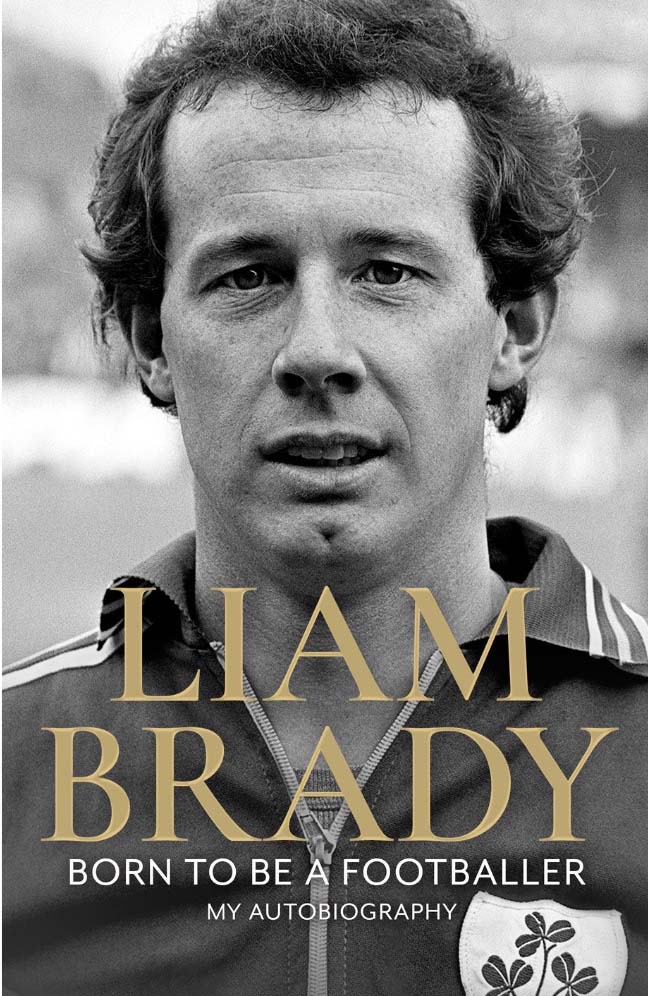
THE GRANNY RULE
When I catch up with Liam Brady, he’s at home in Brighton - one of two clubs he oversaw in a brief managerial career, alongside Celtic. Earlier in the day, he had lunch with fellow ex-Irish player, and one-time Hot Press columnist, Tony Cascarino. Just a few days after our chat, Lionel Messi would take his eighth Ballon D’Or in Paris. It is a measure of Brady’s standing in the game that for three years running, from 1979 to ‘81, he finished in the top ten of the Ballon D’Or voting.
With the Irish team at such a chronically low ebb, it’s hard to imagine any of the current squad enjoying a career like Brady’s.
”Well, funnily enough, talking to Tony Cascarino today - and Tony probably went to play with better Irish teams than me - but in those years, we had more to choose from,” says Brady in his customary droll style. “Because we took advantage of Irish lads being born in England, with Irish parents and so forth. We had a lot to choose from, when you think of Jack’s team: Mick McCarthy, Andy Townsend, Ray Houghton, John Aldridge.
“These were all lads who we wouldn’t haven’t got otherwise. We really availed of what’s called the ‘granny rule’. We always had talented homegrown players in Dublin, Cork and the provinces, but those guys added to it and created a really strong squad. At the moment, I just don’t see that.”
While they may be green shoots with the emergence of Evan Ferguson and one or two other young players, a proper Irish resurgence unfortunately feels a long way off.
”I think we have a really good goalkeeping situation - we have maybe three really good keepers,” suggests Brady. “And we’ve got Evan Ferguson. Then, you’re kind of scratching your head wondering where the next top class player is going to be. Whereas back in the day - and I don’t want to be talking about back in the day! - we had players at the very top of the English game. I was playing abroad and Mickey Walsh was winning championships for Porto… We had options.”
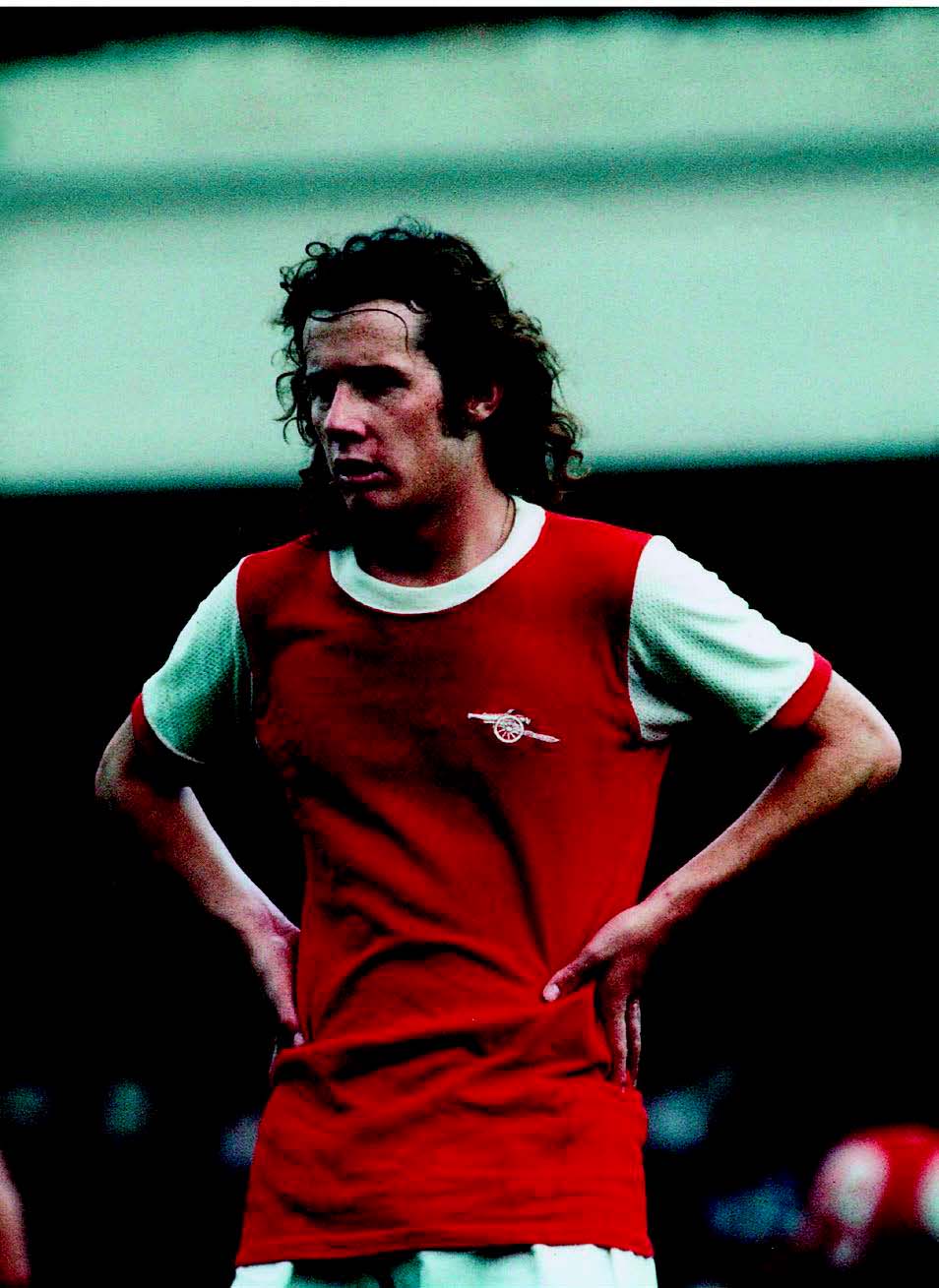 Liam Brady playing for Arsenal.
Liam Brady playing for Arsenal.In Born To Be A Footballer, Brady notes he came from a GAA family, and he himself enjoyed some youthful success with Whitehall Colmcilles and his school team, St. Aidans. Had things been a bit different, Brady could have been a darling of Hill 16 during the Dublin footballers’ all-conquering ‘70s run under Kevin Heffernan.
”I’d like to think I could have done,” he reflects. “A couple of the lads in my St. Aidans gaelic team did great - Tommy Drumm went on to make it big time and Andy Roche played a good few times for Dublin, although he was more of a squad player. But yeah, I was a pretty good GAA player.”
In 1978, the numerous Kildare diehards in my family witnessed one of the most extraordinary GAA-soccer crossovers of all time, when Man Utd’s Kevin Moran travelled home to line out against the Lilywhites in the Leinster final.
“Yeah,” nods Brady, “and him coming back might have made all the difference.”
In the book, Brady paints a vivid picture of the volatile landscape of ‘70s Britain. A major music fan with a love of artists like Bob Dylan and Van Morrison, the ex-footballer writes that the “punks were taking over from the glam-rockers” amid the socio-political tumult.
Still, despite the charged atmosphere of the times, targeting by the opposition - he compares Liverpool full back Tommy Smith to Charles Bronson in Death Wish - and the less-than pristine pitches, Brady thrived at Arsenal.
“I was doing what I loved, Paul,” he says simply. “I was playing in front of full stadiums, and in the late ‘70s, we began to have some success, getting to cup finals. It was thrilling, you were living a dream.”
JUVENTUS & THAT MAN TRAP
The next stop, of course, was Juventus and Trapattoni, who was on his way to becoming one of the most decorated managers of all time. What made him stand out as an individual?
”The guys who are in my opinion the greatest managers, are the ones who have the total respect of the dressing room,” replies Liam. “You’re not gonna please everyone. You might have 18 in the dressing room, or back in the day, maybe 16 at Arsenal. Some players are not going to be playing week-in, week-out, but you’ve got to keep them onside. It depends on the nature and character of the coach.
“I only had Johnny Giles at international level, I didn’t have him at club level. But he and Trap had the ability to create a dressing room where everyone was together, you know what I mean? There were no favourites, no blue-eyed boys. We were all there to play for the team, and that came across loud and clear to everyone of those players.”
As well as the highs, Brady also vividly recounts the more challenging aspects of a life in football. In one extraordinary scene, he recalls a dispute at Ascoli - the Italian minnows he ended up with via stints at Inter Milan and Sampdoria - which concluded with Brady literally being chased around one of the boardrooms.
”Well, it was unreal to me,” he says, shaking his head. “I was probably around 30 or 31, and I’d never seen anything like this, where people refuse to pay you what’s in the contract. I got hold of the document that proved I was entitled to that money, and the guy said, ‘Unless you give it back, there’s gonna trouble’. I said, ‘I’ll jump out the window, I’ll break my legs!’ That’s a true story.”
In terms of Ireland’s success under Jack Charlton, does Brady feel the squad became better organised?
”No, we just got luck we never got before,” he responds. “When we played against Belgium in Brussels the first time around with Jack, we had luck that we didn’t have before, and refereeing decisions that weren’t too harmful to us. Whereas under Eoin Hand and Johnny Giles, we got some diabolical decisions, and that’s why I’m all for VAR. I know people are saying it’s bad for the game and ruining it, but they don’t remember what I put up with.”
Indeed, the book sees Brady highlighting the murky world of ‘80s refereeing. Fans of my generation and younger probably aren’t quite aware of just how badly Ireland suffered at the hands of numerous controversial decisions.
”Paul, I’m telling you, you wouldn’t believe,” he says. “I’ve got video evidence of them. I was going through Google when I was doing this book, and I was looking back on games. I looked at Northern Ireland in the ‘82 World Cup. It was a strange system at that time - you got out of a group and you went into another group. Martin O’Neill scores a perfectly good goal for Northern Ireland against France, two or three yards onside - disallowed. The linesman puts his flag up. The game was seriously bent back in the day.
“FIFA wanted the big countries to advance and things like that. They can’t get away with it now. They still want the big money countries to get forward, but they can’t get away with it as they used to.”
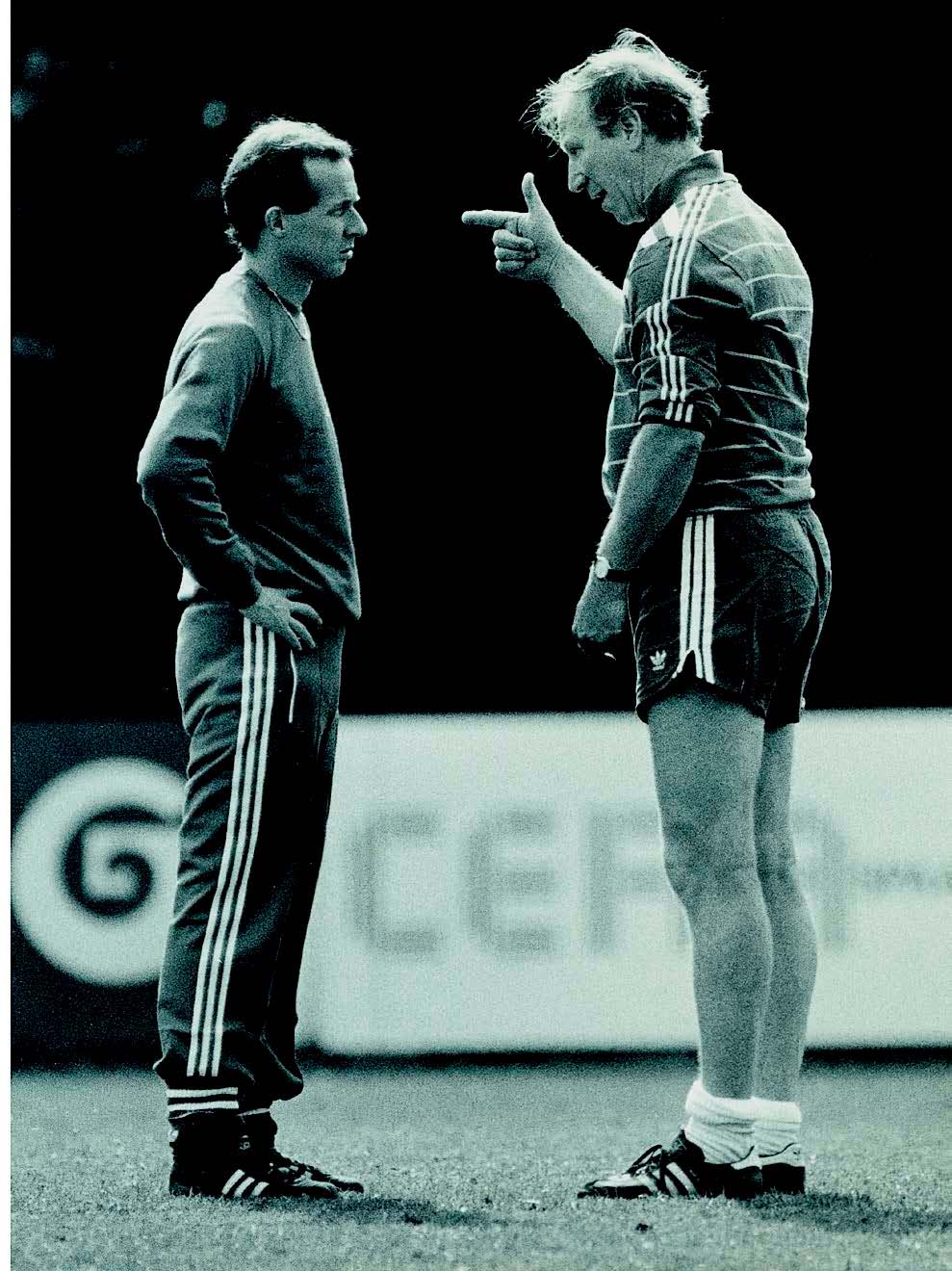 Laim Brady and Jack Charlton
Laim Brady and Jack CharltonAND THEN THERE WAS JACK...
As a stylish midfielder, in some quarters, Brady was seen to be one of the players who most suffered under Charlton’s relentless insistence on the long ball game. Although there were at loggerheads after that testimonial game, in a fine recent RTÉ documentary about Brady, he revealed that Jack subsequently wrote him an apologetic note, a story he elaborates on in the book. Was Brady happy to have had that bit of reconciliation?
“Not really,” he says. “The thing I had with Jack was a disagreement on how the game should be played. I wanted to play for my country, so I went along with what he wanted to do. I did my best in the way he wanted me to play. Then I got injured and missed the Euros. I was gone then – he’d moved onto other players who were more suited to the way the game was played.
“Where I fell out with Jack was the way he kind of discarded me. He could have pulled me aside and said, ‘Liam, I don’t think you can do it anymore.’ Instead, he put me out for 30 minutes in a match against West Germany and subbed me. I thought, ‘Why are you doing that? There’s no need for it’. That was the only real moment - which probably lasted 30 minutes or an hour - where I thought, ‘You’re out of order’
”That’s when we fell out. Apart from that, I adapted my game to play for him. Afterwards, he wrote me that note and that was good of him. I wanted him to do well because I wanted Ireland to do well. I don’t bear grudges.”
Brady would subsequently have a role in an Irish managerial set-up himself, when he joined Giovanni Trapattoni’s backroom team. Ironically, Trap copped considerable flak for his conservative tactics, which had a rather Charlton-like hue.
“Well, yeah, he was at Juventus when I was there, and he had probably one of the greatest sweepers ever to play the game, Gaetano Scirea,” says Brady. “He had full backs like Cabrini, guys who could play out with the ball. Whereas with the Irish team, he probably felt, ‘No, we’re not gonna play that way because we can’t do it. We’re gonna be strong in midfield with two holders, Glenn Whelan and Keith Andrews’.
”Then he wanted his wingers to work really hard, and he’d have a big man and Robbie Keane upfront. I think he got the tactics right for the team he had. I think the jury’s out with Jack - he had more talented players than Trapattoni had.”
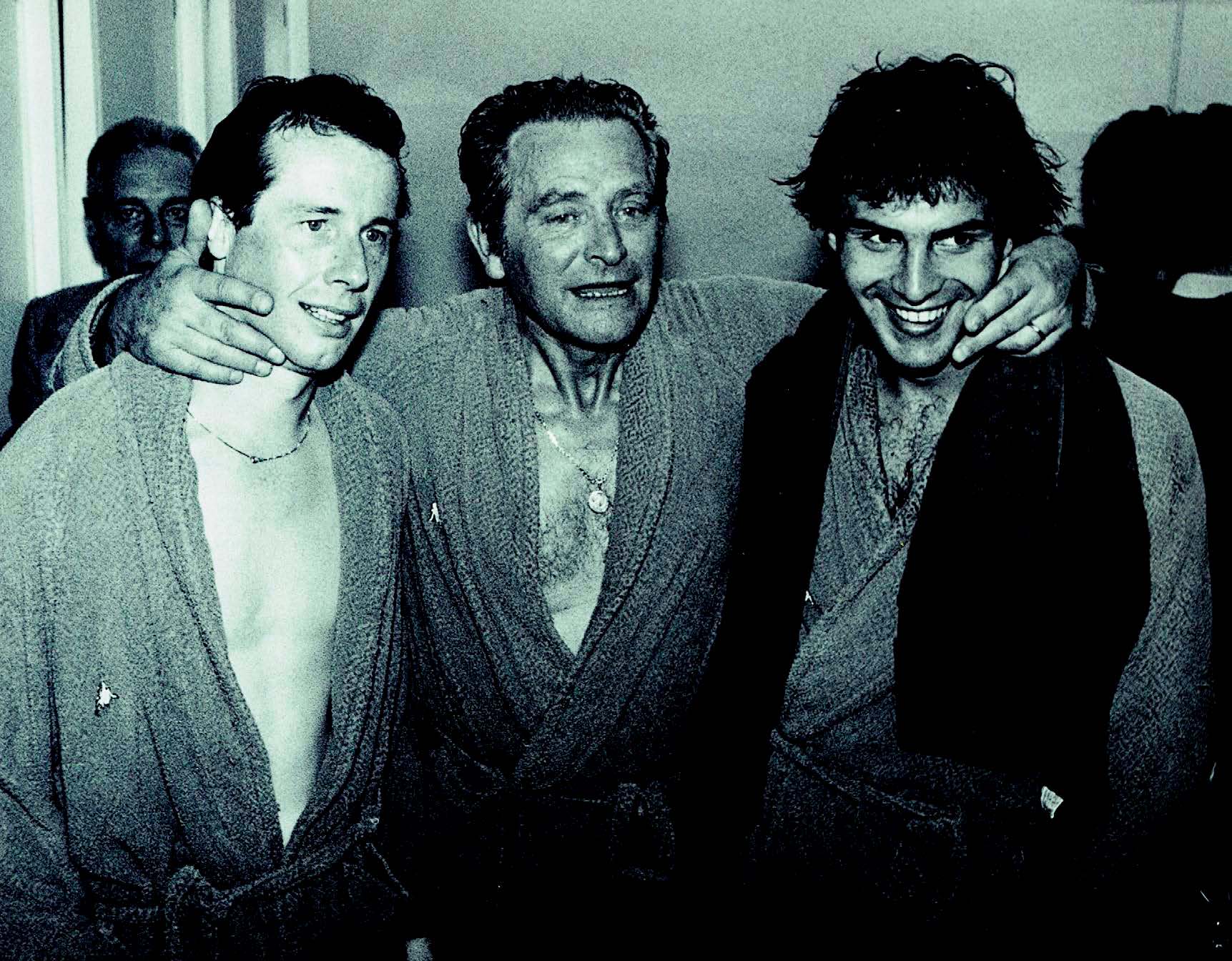 Liam Brady celebrating a Juventus league title alongside teammate Antonio Cabrini and president Giampiero Boniperti.
Liam Brady celebrating a Juventus league title alongside teammate Antonio Cabrini and president Giampiero Boniperti.Unfortunately, Ireland had a lost decade in player development, with much of the FAI’s time devoted to dealing with the controversies of the John Delaney era, as chronicled in Mark Tighe and Paul Rowan’s widely acclaimed book Champagne Football. Did Brady have any insight into what was happening at the association at the time?
“No, we were trying to concentrate on qualifying, we didn’t know what was going in behind the scenes,” he says. “We knew John Delaney was - how can I say? - he was out there. He wanted to be the bee’s knees. We were trying to concentrate on what we were doing, but when I look back now and see what’s happened, it was just all about himself really, wasn’t it?”
PLATINI WILL BE FOUND OUT!
Naturally, in his coaching role at Arsenal, Brady could see the direction the game was headed.
“You see, what happened in England was we were able to take all these academies at Arsenal, Spurs, Man Utd and Man City, and they were able to take the kids at 8 and 9 years of age,” he explains. “You’d try and get the best group of kids you could, and then you’d have another group at 10, and others at 11 and 12. You’d keep coaching them and working on the skills.
It's not rocket science – it’s worked out for England and Ireland has got nothing like that. You’d have to ask why Delaney didn’t try and create that. I think I say in the book, Limerick GAA came to see me, as did Dublin GAA. Not only did they want to know about youth development, but they looked at other aspects of the club.
”How Arsene Wenger did his training day in, day out. And also how you organised travel and trips abroad, things like that. Limerick and Dublin just looked at everything and the FAI never sent anybody!”
Despite retiring from his role with RTÉ earlier this year, Brady was still going strong as an analyst. He was in top form during the now-legendary World Cup final between Argentina and France, enquiring if there was a defibrillator in the studio as the 3-3 thriller headed for penalties.
Apart from the sensational quality of the play, the Messi-Mbappe subplot and all-round ludicrous melodrama made Argentina-France simply the greatest football match I’ve ever seen. Like a great movie or TV show, I can still stick it on randomly and get completely swept up in it.
“It was certainly the best World Cup final I’ve ever seen, and you’d have to put it in the top five of the best games you’ve ever seen,” says Liam. “I just thought, ‘What am I going to say at the end of this match?’ I said it’s the best World Cup final I’ve seen. It was incredible, wasn’t it? And it came the right way for the little man.”
Brady, Giles and Dunphy certainly had their share of classic moments on the RTÉ panel over the years, even if Dunphy was doing my head in towards the end, as he continually gaslit us by denying Ronaldo’s genius.
“He did that with so many players,” notes Brady. “You’re too young to remember, but in the ‘84 Euros he said, ‘Platini will get found out’. Every round they went through, he scored another two goals. He finished up scoring 9 goals in six games and France won the Euros. But Eamon’s entertaining and that’s what he said: ‘It’s showbiz, baby!’”
But, of course, it is more than that too...
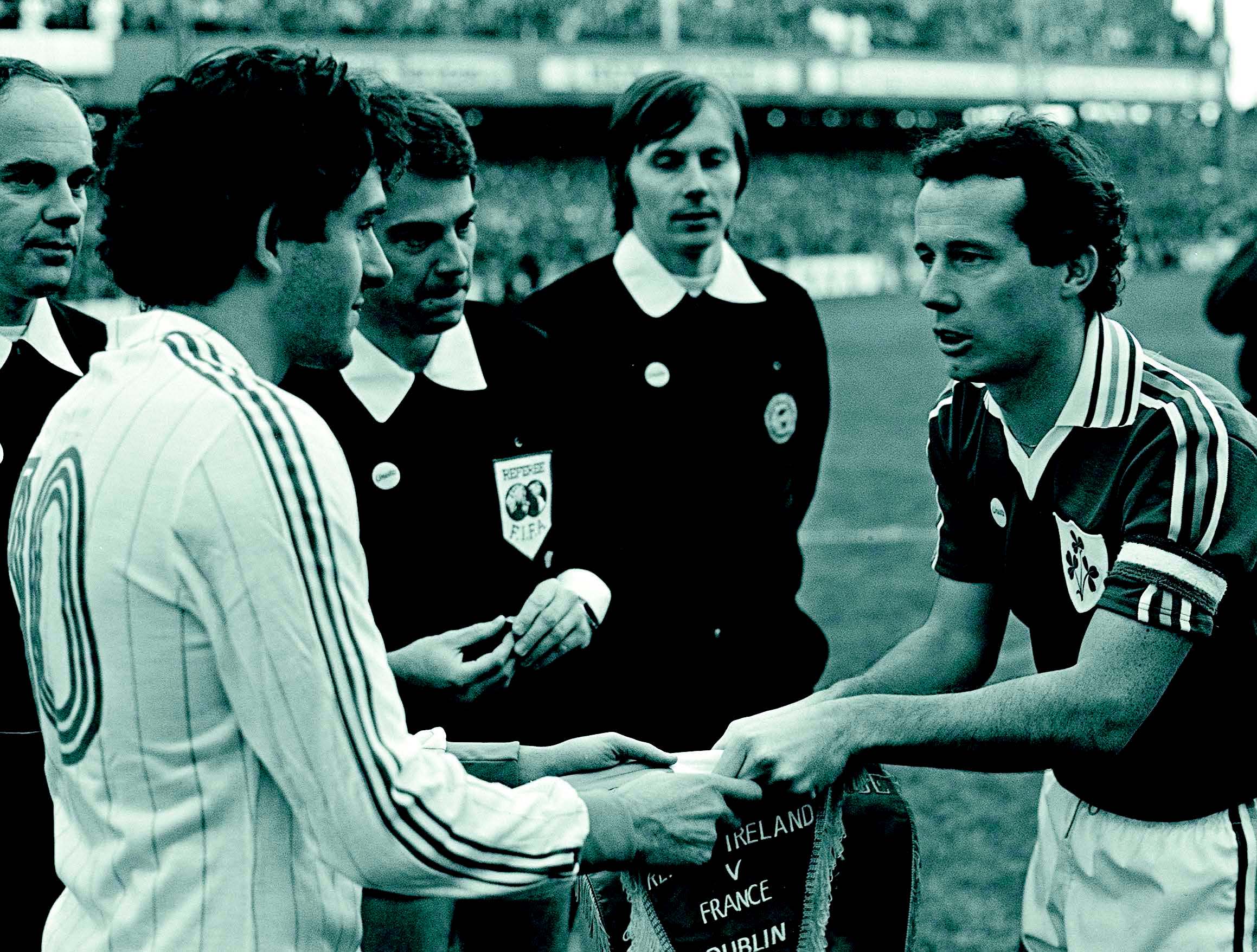 Liam Brady swapping penants with Michel Platini.
Liam Brady swapping penants with Michel Platini.
- Born To Be A Footballer is out now.
RELATED

- Sex & Drugs
- 24 Oct 25
New Dealing With Drugs podcast episode out now

- Lifestyle & Sports
- 22 Oct 25
Hot Flavours: Highlights from Dublin Beer Festival – plus Jess Murphy releases The Kai Cookbook

- Lifestyle & Sports
- 20 Oct 25
Discover European Mushrooms: Learn to make Chestnut Mushroom Soup with chef Eric Matthews of Kicky's
RELATED

- Lifestyle & Sports
- 17 Oct 25
Hot Press College Roadshow 2025: Empowering Students to Recycle Correctly with Repak

- Lifestyle & Sports
- 14 Oct 25
Backlash as Irish Olympian Shane Ryan joins the controversial Enhanced Games

- Lifestyle & Sports
- 11 Oct 25
Special Report: Bohemian FC Women's Squad - Making Giant Strides

- Lifestyle & Sports
- 10 Oct 25
Hot Press College Roadshow 2025 (Photos)

- Lifestyle & Sports
- 09 Oct 25
Pellador announce Michael D. Higgins inspired football jersey in collaboration with Claddagh Records

- Lifestyle & Sports
- 07 Oct 25

